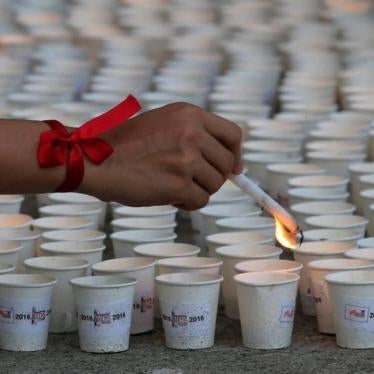(New York) - A video telling the story of Kiran Yadav, an Indian woman who died needlessly in childbirth, has been nominated for a prestigious Webby award, Human Rights Watch said today. The video, produced by Human Rights Watch with award-winning Magnum photographer Susan Meiselas, is nominated for Best Documentary: Individual Episode. It highlights the dangers faced by women in India, where more than 60,000 pregnancies end each year in preventable deaths.
Hailed as the "Internet's highest honor" by the New York Times, The Webby Awards is the leading international award honoring excellence on the Internet. The Human Rights Watch video, produced with Magnum In Motion, is also eligible for the Webby People's Voice Award, which is determined by online votes cast by the global Web community. Supporters of Human Rights Watch have until April 29, 2010, to cast their votes in the People's Voice Awards at http://webby.aol.com/entries/49544.
"We're thrilled to see our work recognized by the Webby Awards, which celebrate innovation and creativity on the Internet," said Kenneth Roth, executive director at Human Rights Watch. "But most of all we hope people will be moved by Kiran's story to get involved and help Human Rights Watch to better the lives of women in India and beyond. The Web community can play a critical role in spreading information about human rights abuses and how to end them."
"In Silence: Maternal Mortality in India" tells the story of Kiran Yadav, who died at 25 after giving birth to a baby boy, her third child. She gave birth at a rural clinic but began to hemorrhage and died while her relatives were trying to persuade the district hospital to admit her. Her sister-in-law has to care for the three children and work in the peppermint fields.
Around the world, some 400,000 women and girls die each year from pregnancy and childbirth, and India accounts for almost a quarter of these maternal deaths, the vast majority preventable. Human Rights Watch's investigation into maternal deaths in Uttar Pradesh documented the poor state of maternal health services for the rural poor, and serious short-comings in how the authorities count maternal deaths, investigate their causes and avoid repeating mistakes.
Human Rights Watch was also an honoree in the Public Service and Activism category with a video about police brutality in India.
Winners will be announced on May 4 and honored at a star-studded ceremony in New York on June 14. The awards are presented by the International Academy of Digital Arts and Sciences.
Advances in Fighting Maternal Death
In a recent report Human Rights Watch analyzed India's maternal health policies in Uttar Pradesh state, which has one of the highest maternal death rates in India. One of our most important findings was that the government was not tracking the problem closely enough - and understanding the scope and underlying causes of the problem is the first step toward solving it.
After analyzing the data, we recommended that the government track all pregnancy outcomes, investigate the causes of deaths and monitor access to emergency obstetric care. We also urged the creation of a complaints system for women and their families to register grievances and access reparation for harm caused.
A new study in the medical journal The Lancet says the number of women dying from pregnancy and childbirth is dropping worldwide. That's good news! But there is still much more to be done. The study estimates that only 23 countries are on track to meet international goals for reducing maternal death rates. It also notes that HIV/AIDS has slowed progress in reducing maternal deaths, especially in sub-Saharan Africa.
Like Human Rights Watch, the authors of the Lancet article call for reforming healthcare systems and "delivery of interventions to women when and where they need them." Over the last six years, countries like Sri Lanka and Malaysia have managed to halve their maternal mortality numbers. By putting in place the right measures, we believe that other countries - including India -- should be able to do the same.








